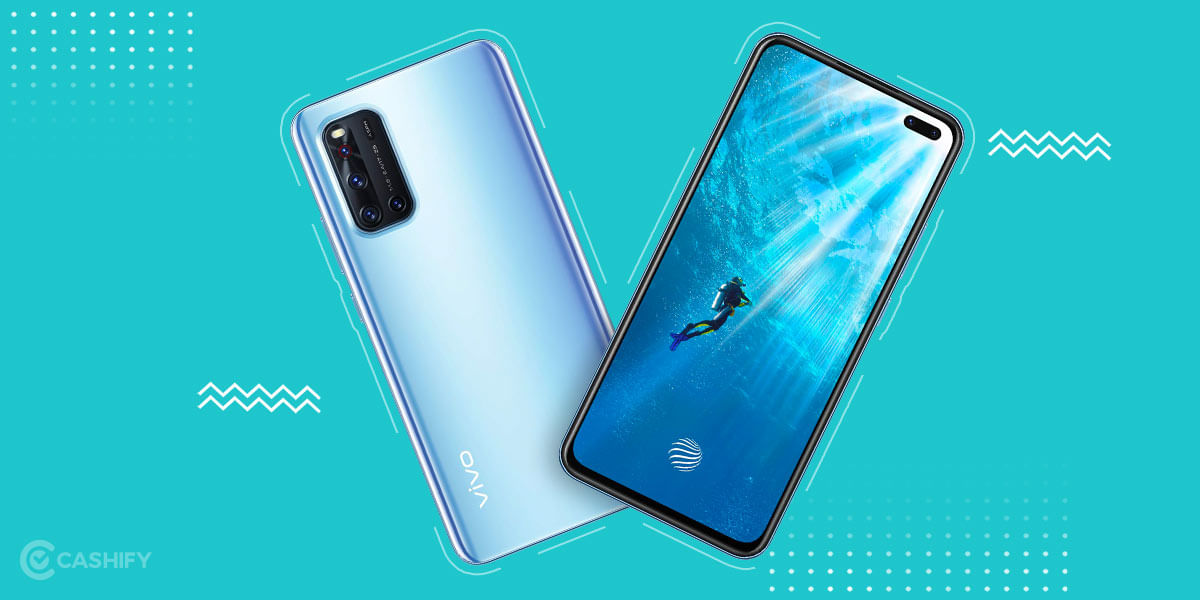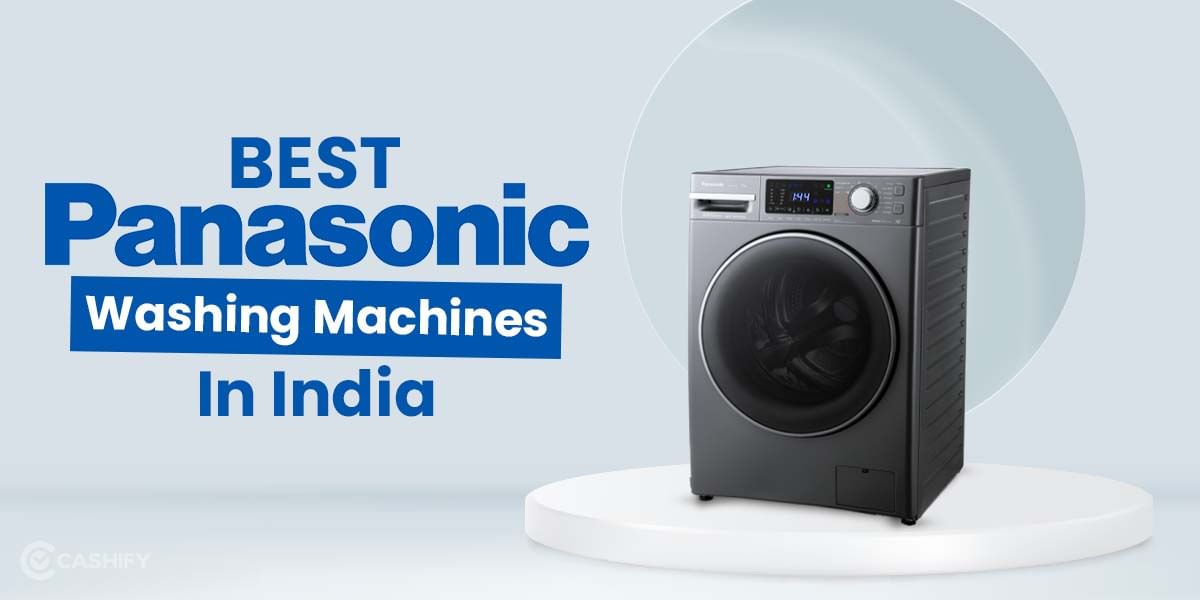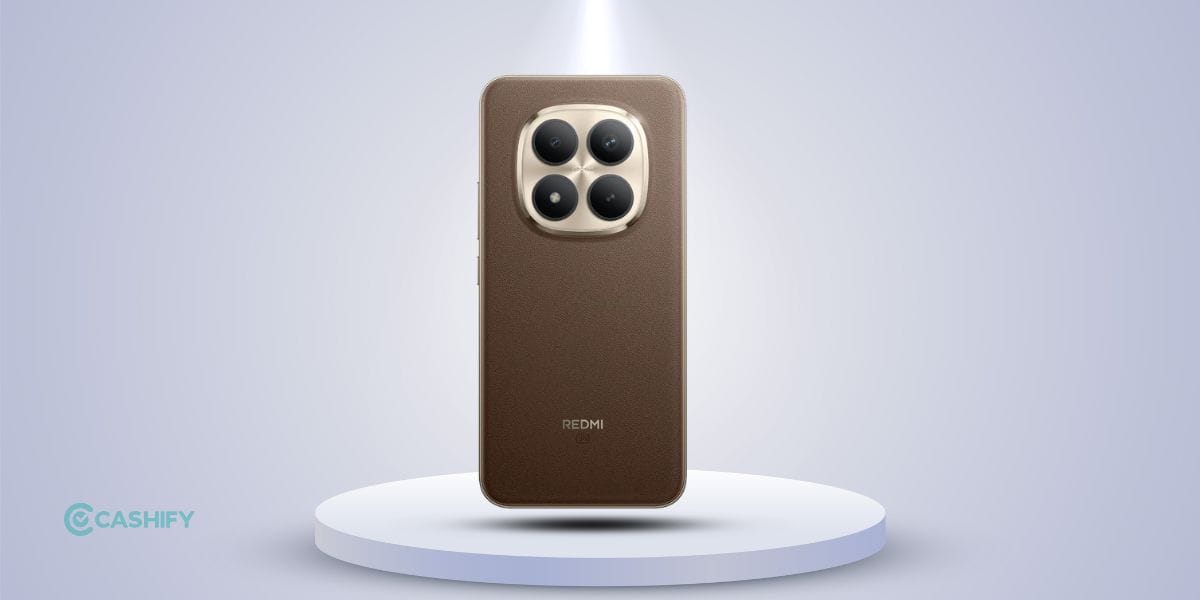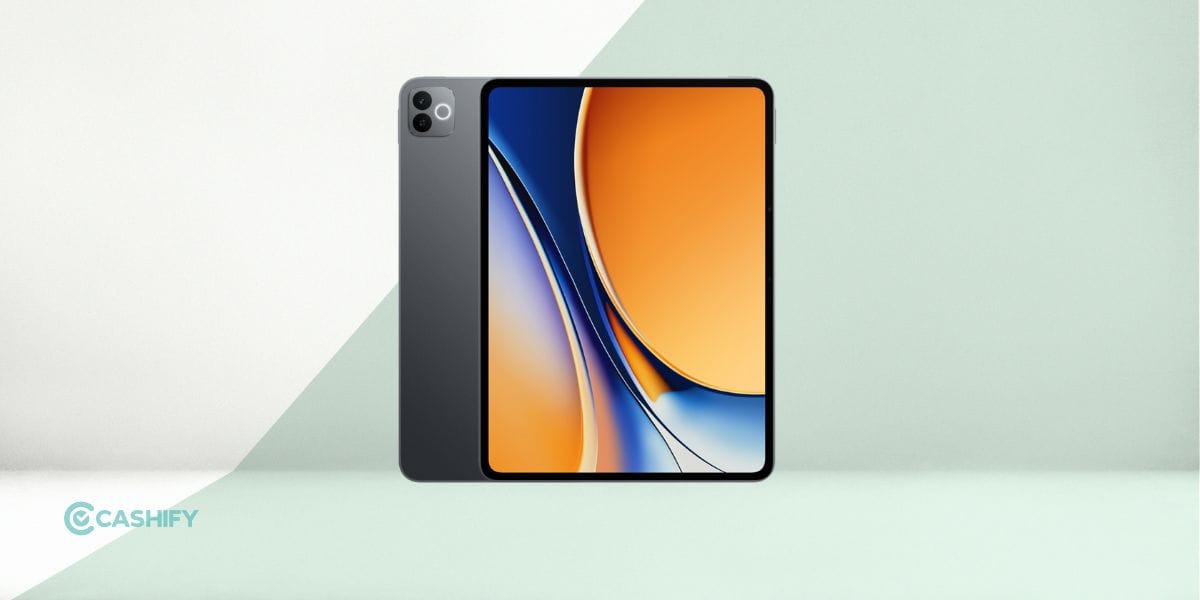Introduction
Chinese smartphone maker Realme had been teasing it’s Narzo 10 series a lot before it went official on May 18th 2020. Realme calls the Narzo as a new gaming-centric smartphone series that gets added to the company’s budget smartphone line-up. The Realme Narzo series includes two devices – the Realme Narzo 10 and the Realme Narzo 10A. Both the devices enter the budget smartphone market with aggressive pricing and claim to be the budget gaming powerhouses that offer a seamless gaming experience that only costlier devices were able to offer till now.
The Realme Narzo 10a will compete with other smartphones in the sub-10k price segment whereas the costlier Realme Narzo 10 is launched to dominate the sub-15k price segment in India. With the budget smartphone segment getting flooded with so many worthy competitors, the decision to invest in the right device often becomes difficult.
So, to make things easier here is our honest and in-depth review of the Realme Narzo series so as to enlighten you with the specifications and real-life performance of the devices which would help you decide whether the smartphones check all the boxes that you require or not. Since, both the smartphones posses’ minor differences, the review would contain our opinions about both the devices to also let you compare which of the two suits you the most.
Prices in India, Variants, Availability
The cheaper Realme Narzo 10A launch price in India is set at just Rs. 8,499 for the 3GB+32GB variant. On the other hand, the Realme Narzo 10 gets a price tag of Rs. 11,999 for the 4GB+128GB variant. Unfortunately, Realme has offered just a single RAM and storage option for the devices in its latest Narzo series.

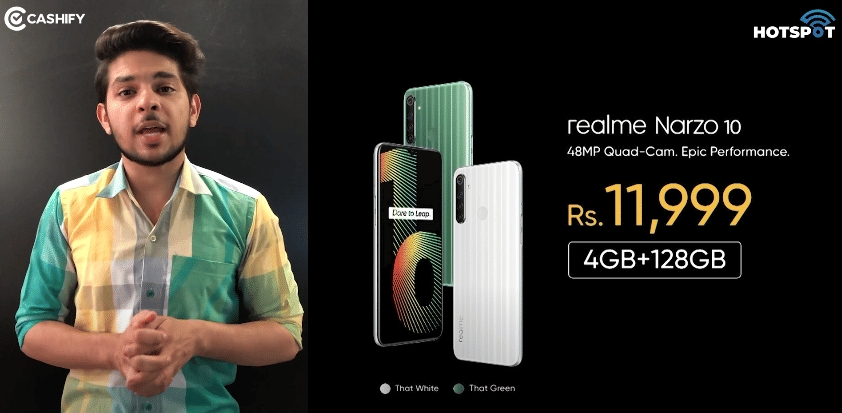
Both the devices can be purchased via Flipkart or Realme’s official site and also through authorized offline retailers.
Box Contents
Here is a quick overview of what you’ll be getting inside the box:
- Realme Narzo 10/10A
- 18W/10W fast charger respectively
- Charging cable
- Manuals and Documentation
Specs at a glance
Before we jump right into our in-depth review, let us first have a glance at the key specifications of both the devices:
Realme Narzo 10A
- Display: 6.5-inches LCD, 1600 X 720 pixels
- Processor: Octa-Core MediaTek Helio G70
- RAM & ROM: 3GB/32GB
- Software: Realme UI based on Android 10
- Rear cameras: 12MP (main) + 2MP (macro) + 2MP (portrait)
- Selfie camera: 5MP
- Battery: 5000 mAh battery, 10W charging
- Weight: 195g
- Dimensions: 164.4 mm x 75 mm x 8.9 mm
Realme Narzo 10
- Display: 6.5-inch HD+, Corning Gorilla Glass 3
- Processor: Mediatek Helio G80
- Security: Fingerprint scanner, Face Unlock
- RAM & ROM: 4GB/128GB
- Software: Realme UI based on Android 10
- Rear cameras: 48MP (primary) + 8MP (ultra-wide-angle) + 2MP (macro) + B&W portrait lens
- Selfie camera: 16MP
- Battery: 5000 mAh, 18W quick charge
- Weight: 199g
- Dimensions: 164.4mm x 75.4mm x 9mm
Design and Build
Being a budget smartphone series, the Narzo didn’t hold any great expectations when it comes to design and hardware quality. Talking about the Narzo 10A, the device features a contrasting design as compared to previous Realme smartphones such as those from the ‘Realme C series’. The Narzo 10A doesn’t get any fancy textures or patterns, nor any gradient colour tone at the back. Instead, the device comes in a single, minimal colour which Blue or White to choose from. There’s also a huge Realme logo running vertically across the entire back of the device. Although, we personally prefer a gradient or at least a textured back design in 2020, the plain single-tone colour on the Realme Narzo 10A also looks decent enough.
Coming to the Realme Narzo 10, the device looks very similar to the Narzo 10a when it comes to the overall structure. We get a similar back which is made up of plastic with a pattern of vertical stripes that show a gradual shift in position when we move this phone around under the light. With two colour options to choose from i.e. ‘That Green’ and ‘That White’, the Narzo 10 looks quite appealing with a better, polished finish when compared with other Realme smartphones which come with a similar plastic back.
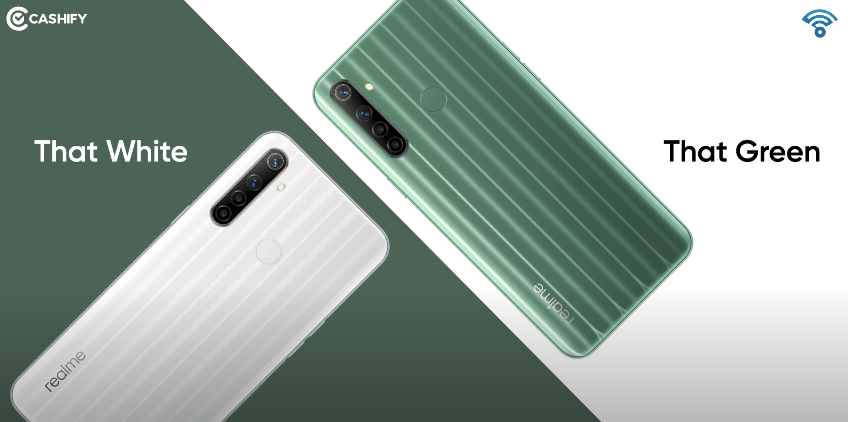
Both the devices feature a vertically stacked rear-camera setup which is placed along the top-left edge with a physical fingerprint scanner located at the centre of the back panel. The button placement for both the devices is similar to the power and volume buttons positioned on the right and left respectively. Along with the volume, buttons sits the removable tray which houses two Nano-SIM slots as well as a microSD card slot. At the bottom is the charging port along with a 3.5mm audio jack and speaker grille. The Narzo 10a features a Micro-USB port but fortunately, the Narzo 10 flaunts the Type-C one.
Display
The display configuration is exactly the same for both the devices, which might be strange for some as it leaves very few areas to justify the increased pricing of the Realme Narzo 10. So, at the front of both the Realme Narzo 10 and the Narzo 10a is 6.5 inches HD+ IPS LCD display which comes with a resolution of 720 x 1600 pixels. Both the devices have the same 20:9 aspect ratio and sport an old-school water-drop style notch; which gives a screen-to-body ratio of 82.9%. With a pixel density of 269ppi, both the devices get Gorilla Glass 3 protection on top.
Check Out: Realme 6 Review
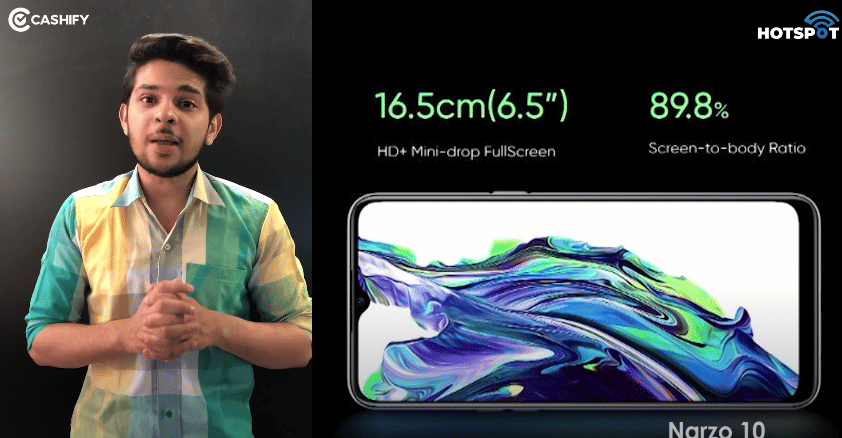
This configuration is quite good for the Realme Narzo 10A. However, the lack of a Full-HD panel is a disappointment when we talk about the costlier Narzo 10 as the HD+ resolution can be felt to lag behind, especially when it comes to multimedia and gaming. The company’s own Realme 6 series offers a much better 90Hz refresh rate panel at Rs. 13,999. Talking about the display quality, the experience was decent and in terms of brightness, sharpness, and colour reproduction, the panel met our expectations. With 480 nits of brightness, the display looks just okay in sunlight, which is the situation we normally deal with in pocket-friendly devices. However, for the price you are paying for the Narzo 10, you can always expect something better than this.
Performance
Things really change when we talk about the internals of both the devices, as both of them are powered by different chipsets and also differ in their RAM and storage department. First, let’s talk about the Realme Narzo 10A. The device’s powertrain includes the Mediatek Helio G70. It is a 12nm SoC with two 2.0 GHz Cortex-A75 and six 1.7 GHz Cortex-A55 cores. This octa-core chipset is further clubbed with Mali-G52 2EEMC2 GPU, 3GB RAM and 32GB of expandable storage.
Check the video overview here: Realme Narzo 10 and 10A
The Mediatek Helio G70 sits slightly above the Snapdragon 665 and is claimed to get better at graphics performance when compared with Snapdragon 675. And this goes truly as said when we get to experience the real-life performance of the device. So, heavy and graphic intense games went smooth sailing and we didn’t notice any lag or whatsoever. Multitasking was efficient and we didn’t notice any heating issues. The chipset makes the Narzo 10a one of the most powerful phones at this price.
Coming to the Realme Narzo 10, we get the Mediatek Helio G80 (12nm) under the hood. The chipset is also an octa-core one with two 2.0 GHz Cortex-A75 and six 1.8 GHz Cortex-A55 cores which are further seated with the Mali-G52 MC2 GPU. The device gets a larger 4GB of RAM and 128GB of expandable storage. As claimed by the manufacturer, the chipset is capable of managing the CPU, GPU and memory so as to get better control on power and performance as per the demands of different usage scenarios.

The Mediatek Helio G80 on the Realme Narzo 10 delivers a sleek performance and makes the device really efficient at handling everyday tasks. It truly justifies the budget gaming smartphone tag as we the device managed to run almost every other game fluently and without any hiccups.
Software
Both the devices run RealmeUI user interface which is based on Android 10. We found the RealmeUI as a major upgraded and improved version of the ColorOS which Realme offered in previous smartphones. The UI is refined with numerous personalisation and customization options. However, it is full of bloatware.
Cameras
This is one of the most prominent areas where the Realme Narzo 10 overpowers the Realme Narzo 10A. The Realme Narzo 10 gets a quad-camera setup at the back which includes a 48MP primary sensor with f/1.8 aperture and an 8MP ultra-wide lens with f/2.25 aperture with 119 degrees FoV. There is also a 2MP monochrome portrait sensor with an f/2.4 lens, alongside a 2MP macro shooter with f2.4 aperture. At the front is a 16MP f/2.0 sensor for selfies.
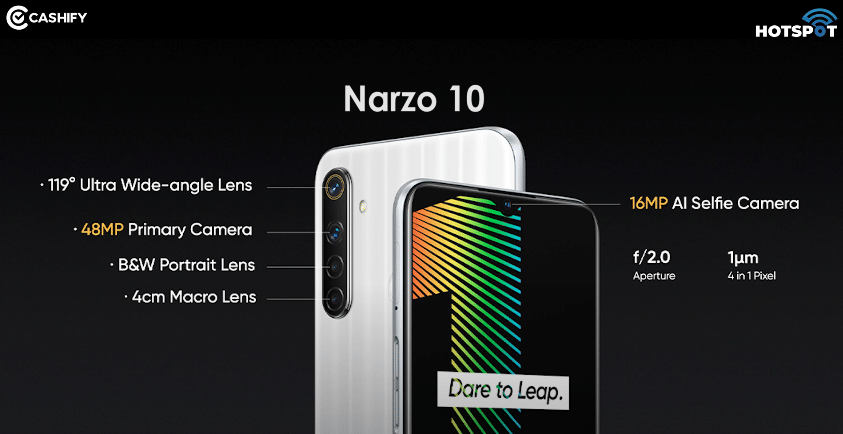
The Realme Narzo 10A, on the other hand, gets a triple rear camera setup with a totally different set of lenses. So, there’s a 12 MP primary lens with f/1.8 aperture. Sitting along is a 2 MP macro camera with f/2.4 aperture and a 2 MP depth sensor with f/1.8 aperture. For selfies, there is a 5 MP lens with f/2.4 aperture.
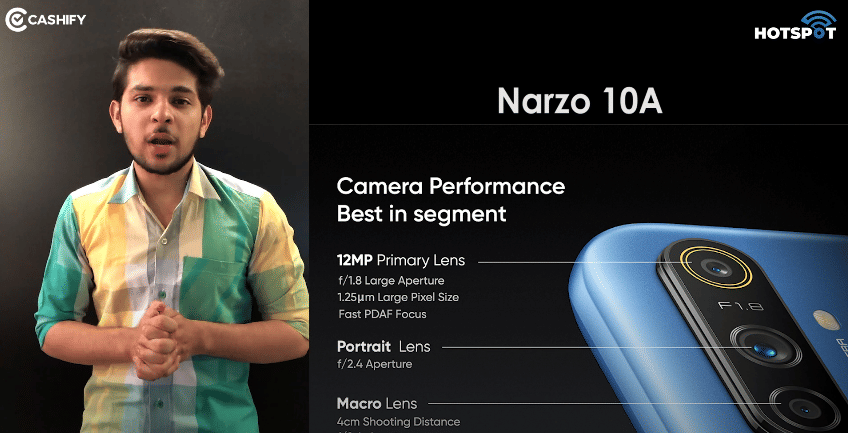
That’s all on the spec-sheet. What about the real-life camera performance? The Realme Narzo 10 gets a larger variety of shooting modes, including night mode, as compared to the Realme Narzo 10A. Shots taken with the Narzo 10 in bright sunlight came out to be impressive. The sensor caught great details and the camera delivered images with well-balanced exposure. The images with the wide-angle lens as well as the portraits came out to be decent enough, although there are many areas where we wish some improvement. As we see in any Realme smartphones, the selfies got beatification by default which was okay, but we still expected them to be better.
Talking about night mode, which was only present on the Realme Narzo 10, photos did make a noticeable difference as the images got a good amount of details and reduction in noise. All in all, the camera performance of the Narzo 10 didn’t go that great as we expected, but it was also not disappointing.
The primary camera of the Realme Narzo 10A is decent enough with the capabilities of capturing good landscapes and images of objects. However, we did feel a lack of detail and dull colours, especially in indoor or artificial lighting. Although there is a dedicated depth sensor, portraits didn’t come out to be that great. The selfies came out to be average with nothing out-of-the-box to mention about. The camera performance on the Narzo 10a was decent when we consider the price tag at which the device is offered.
Talking about videos, the rear camera of both the devices supports 1080p video capture. In the front, both the smartphones support Full-HD video recording at 30 frames per second. The videos were just ordinary and lacked stabilization. Details were decent in daylight on both the devices and we do get an option to shift to wide-angle mode on the Realme Narzo 10, which is good.
Battery
Both the smartphones get a similar battery configuration, but it is the charging speeds where the Narzo 10 gets better. So, both the Realme Narzo 10 and the Narzo 10A get a gigantic non-removable 5000mAh battery. While the Narzo 10A gets a standard 10W charging support, the costlier Narzo 10 gets 18W Fast charging support. Both the phones also support Reverse charging via a USB-OTG adapter, which is interesting.
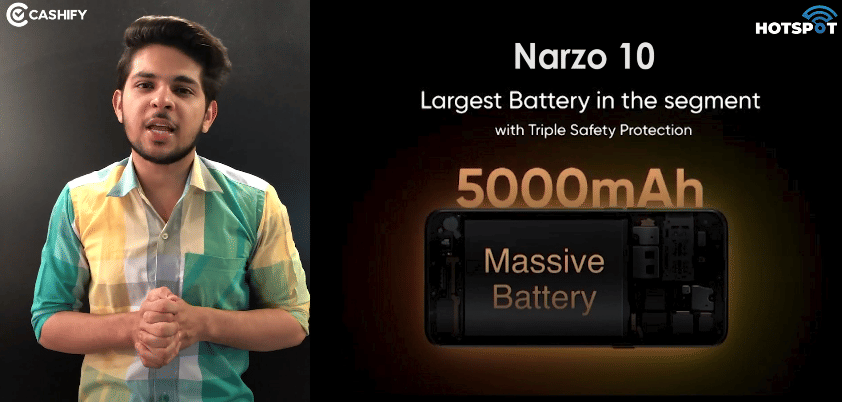
Audio, Connectivity, Biometrics
Being budget devices, we can expect some standard things when it comes to additional features such as audio. So, there is a mono-speaker placed sitting at the bottom of both the devices alongside the charging port. The audio quality from both the devices was average and we found it slightly rough. The volume too could have been louder but it is okay for casual usage such as gaming or media streaming.
Connectivity options include Bluetooth 5, FM radio, Wi-Fi 802.11n, and GPS. On the Narzo 10, we get the modern USB Type-C port whereas the Narzo 10A gets an old-school Micro-USB port for charging and data transfer.
For security, both the phones come equipped with a rear-mounted fingerprint scanner and also get face-unlock as an alternative. The fingerprint sensor on both the devices works exactly as you would expect it too. It is quick, reliable and accurate. However, we did find the placement of the sensor a bit out-of-reach on both the devices.
The Face-Unlock on both the devices, as we have seen in other Realme smartphones, works just fine. It is a great alternative if you have wet hands or are unable to access the fingerprint scanner for some reason.
Pros & Cons
Realme Narzo 10A
Pros:
- Mediatek Helio G70 chipset
- 5000 mAh battery
- Competitive pricing
Cons:
- Similar design
- Just 3GB RAM
Realme Narzo 10
Pros:
- A bigger battery of 5000mAh with type C port and 18W fast charger.
- 48MP Quad-Camera
- Budget gaming phone with Helio G80 chipset
Cons:
- Narzo 10 comes with 6.5-inch HD plus display whereas the Realme 6 had FHD+ Display.
- It comes with the old pin-hole camera and not the newer punch-hole design front camera of the Realme 6.
- Realme 6 comes with a higher refresh rate than the new Narzo 10, which makes the viewing device smoother than the Narzo 10.
The Realme Narzo series’ devices, no doubt are a worthy competitor in their respective price segments. This specifically holds true for the Realme Narzo 10A which offers a great price to performance ratio in the sub-10k price segment. A powerful processor, a decent set of multi-lens cameras and a large display covering up a massive battery make the Narzo 10A a complete package and a device worth investing upon.
Unfortunately, the same doesn’t go as good for the costlier Realme Narzo 10. The device, at a price tag of Rs. 11,999 isn’t actually an all-rounder as it does come with a lot of compromises. The most disappointing of this is the lack of an FHD+ panel which almost every other smartphone in this price segment offers. With a lot of focus on making the device gaming-centric, users would definitely feel the wish to get an improved camera system. The design too, is quite dated, thanks to the waterdrop notch at the front. It is therefore highly recommended to reconsider the Realme Narzo 10, as adding a few more bucks can get you the much better Realme 6 or the Redmi Note 9 Pro. Both of these devices, at a price tag of Rs. 13,999; offer much better value for money with a better FHD+ display, a higher refresh rate panel (for Realme 6), a modern design and a better camera system.



